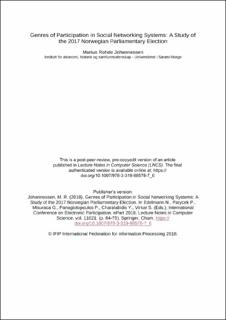Genres of Participation in Social Networking Systems: A Study of the 2017 Norwegian Parliamentary Election
Chapter, Peer reviewed
Accepted version
Permanent lenke
https://hdl.handle.net/11250/2686207Utgivelsesdato
2018Metadata
Vis full innførselSamlinger
Originalversjon
Johannessen, M. R. (2018). Genres of Participation in Social Networking Systems: A Study of the 2017 Norwegian Parliamentary Election. I Edelmann N., Parycek P., Misuraca G., Panagiotopoulos P., Charalabidis Y., Virkar S. (Red.), International Conference on Electronic Participation. ePart 2018. Lecture Notes in Computer Science, vol. 11021, (s. 64-75). Springer, Cham https://doi.org/10.1007/978-3-319-98578-7_6Sammendrag
Norwegian political parties have used the Internet for campaigning since 2001. In 2009 all the parties represented in parliament experimented with social media, and in 2013 social media had become an important and integrated part of the parliamentary election campaign. This paper is a continuation of studies conducted in 2009 and 2013 on the communication genres used by political parties and voters during the campaign. In 2009, a genre system for political communication was emerging. In 2013 the genre system was more established and professionalised. This paper presents findings from the latest election in 2017, where there was concerns that the polarizing effects of Brexit, right-wing populism and the Trump campaign would influence online political communication during the campaign. The findings indicate that polarization is indeed part of the picture, but mostly when we view social media in isolation. The paper concludes by discussing the implications for democracy and the public sphere.
